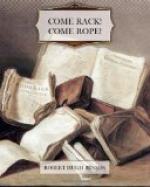To his father he had said no more, nor he to him. His father sat quiet in the parlour, or was in his own chamber when Robin was at home; but the lad understood very well that there was no thought of yielding. And there were a dozen things on which he himself must come to a decision. There was the first, the question as to where he was to go for Easter, and how he was to tell his father; what to do if his father forbade him outright; whether or no the priests of the district should be told; what to do with the chapel furniture that was kept in a secret place in a loft at Matstead. Above all, there hung over him the thought of what would come after, if his father held to his decision and would allow him neither to keep his religion at home nor go elsewhere.
On the second day, therefore, he rode out (the frost still holding, though the sun was clear and warm), and turned southwards through the village for the Dethick road, towards the place in which he had appointed to meet Anthony. At the entrance to the village he passed the minister, Mr. Barton, coming out of his house, that had been the priest’s lodging, a middle-aged man, made a minister under the new Prayer-Book, and therefore, no priest as were some of the ministers about, who had been made priests under Mary. He was a solid man, of no great wit or learning, but there was not an ounce of harm in him. (They were fortunate, indeed, to have such a minister; since many parishes had but laymen to read the services; and in one, not twenty miles away, the squire’s falconer held the living.) Mr. Barton was in his sad-coloured cloak and round cap, and saluted Robin heartily in his loud, bellowing voice.
“Riding abroad again,” he cried, “on some secret errand!”
“I will give your respects to Mr. Babington,” said Robin, smiling heavily. “I am to meet him about a matter of a tithe too!”
“Ah! you Papists would starve us altogether if you could,” roared the minister, who wished no better than to be at peace with his neighbours, and was all for liberty.
“You will get your tithe safe enough—one of you, at least,” said Robin. “It is but a matter as to who shall pay it.”
He waved good-day to the minister and set his horse to the Dethick track.
* * * * *
There was no going fast to-day along this country road. The frosts and the thaws had made of it a very way of sorrows. Here in the harder parts was a tumble of ridges and holes, with edges as hard as steel; here in the softer, the faggots laid to build it up were broken or rotted through, making it no better than a trap for horses’ feet; and it was a full hour before Robin finished his four miles and turned up through the winter woodland to the yeoman’s farm where he was to meet Anthony. It was true, as he had said to Mr. Barton, that they were to speak of a matter of tithe—this was to be their excuse if his father questioned him—for there was a doubt as to in which parish stood this farm, for the yeoman tilled three meadows that were in the Babington estate and two in Matstead.




